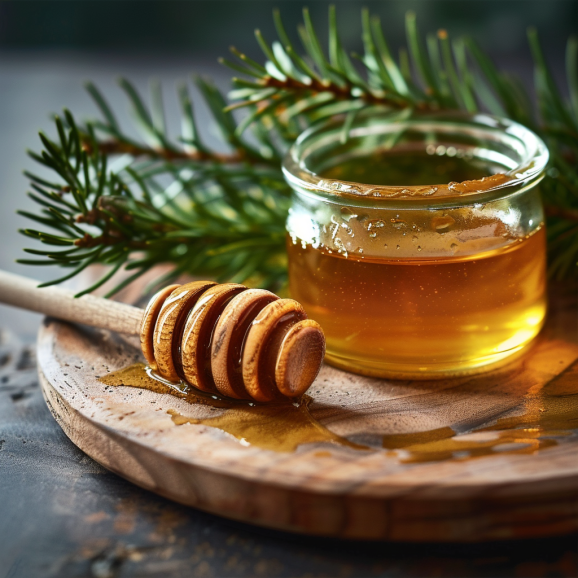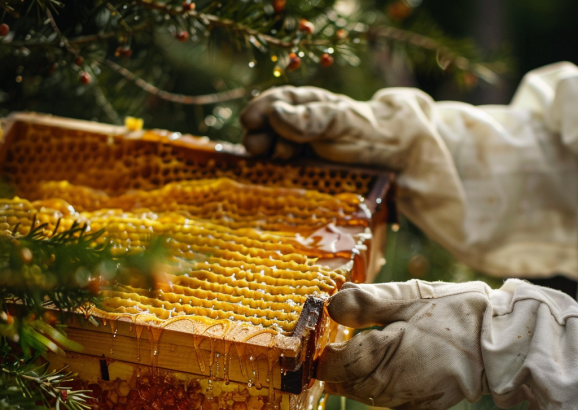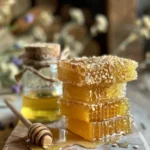
Introduction to Greek Fir Honey
Greek fir honey, derived from the sap of the Greek fir tree located predominantly in the mountainous regions of Greece, offers a unique culinary and medicinal profile that distinguishes it from other types of honey. This article explores Greek fir honey’s distinct characteristics, its production processes, health benefits, and its cultural and economic impact.
What is Greek Fir Honey?
This unique variety of honey is produced from the sap of the fir trees native to the mountainous regions of Greece. Known for its rich, woody flavor and a slightly resinous aroma, it stands out due to its thick consistency and dark color, which differentiate it from more common types of honey. This honey is not only prized for its distinctive taste but also for its health-promoting properties, including high levels of antioxidants and beneficial enzymes. It is harvested in a traditional, sustainable manner that helps preserve the health of the local ecosystems where the fir trees thrive.
Origins and History
This distinctive honey has roots that trace back to ancient Greece, where it was highly valued for both its unique flavor and medicinal properties. Historically, it has been documented in various ancient texts, illustrating its role in traditional diets and healing practices. It was particularly revered among ancient healers who used it in remedies to treat wounds and respiratory conditions. The production techniques have been passed down through generations, maintaining traditional methods that respect the natural cycles of the fir trees from which the honey is derived. This connection to history not only enriches its cultural significance but also highlights the deep-seated traditions of beekeeping in the region.
Unique Properties of Greek Fir Honey
This rare variety of honey is distinguished by its remarkable characteristics which include a deep, amber hue and a viscous texture that is smoother than that of typical floral honeys. It carries a distinct flavor profile with hints of smoky wood and subtle balsamic undertones, making it a standout among other honey varieties. Additionally, it boasts impressive health benefits due to its high mineral content and abundance of powerful antioxidants, which contribute to its reputation as a superior natural remedy for various ailments. The resinous component that infuses it with its unique flavor also imparts antiseptic properties, which are highly valued in natural medicine.
How Greek Fir Honey is Harvested
he harvesting process of this rare honey involves traditional methods that have been perfected over centuries. It is extracted during the late spring and early summer when the sap flow from the fir trees is most abundant. Beekeepers in the mountainous regions of Greece use specialized tools to carefully collect the honey without disturbing the bees or the natural habitat. This method requires precise timing and deep knowledge of bee behavior and environmental conditions to ensure a sustainable yield. The practice is not only labor-intensive but also steeped in cultural tradition, passing from one generation to the next as an important aspect of local heritage and ecological preservation.

Tools and Techniques
The extraction of this distinctive honey involves an array of specialized tools and time-honored techniques. Beekeepers utilize smoke to gently calm the bees, a practice that allows for the safe removal of the honeycomb without agitating the colony. The use of modern stainless steel extractors then enables the careful separation of honey from the comb while preserving its natural qualities and flavor.
Additionally, beekeepers employ protective gear and gentle handling methods to maintain the health of the bees and ensure the sustainability of the hive. These techniques, combined with a profound understanding of bee behavior and environmental influences, are essential for harvesting this high-quality honey while respecting and sustaining the natural ecosystem.
Seasonal Patterns in Honey Production
The production of this unique honey is deeply influenced by seasonal patterns, which dictate the availability and quality of the sap collected by the bees from fir trees. Typically, the honey-making process peaks during the late spring and early summer when the weather conditions are most favorable. During this period, the fir trees produce a rich, aromatic sap that the bees gather zealously.
As temperatures rise and the days lengthen, the bees become more active, and honey production increases. However, variations in climate such as unexpected cold snaps or excessive rainfall can significantly impact the sap flow and consequently, the honey yield. Beekeepers must closely monitor these seasonal dynamics and adjust their practices accordingly to maintain the health of their colonies and optimize the harvest.
Health Benefits of Greek Fir Honey
This variety of honey is celebrated for its impressive health benefits, which stem from its rich composition of natural compounds. It is particularly noted for its high levels of antioxidants, which play a crucial role in combating oxidative stress and reducing the risk of chronic diseases such as heart disease and diabetes. Additionally, its antimicrobial properties make it a potent natural remedy for treating wounds and infections by inhibiting bacterial growth and promoting healing. It also offers soothing effects for sore throats and coughs, making it a popular choice during cold and flu season.
Furthermore, the high mineral content, including significant levels of magnesium and potassium, supports overall health by contributing to the proper functioning of the body’s systems. Regular consumption can help enhance immune system function, improve digestion, and even contribute to better sleep patterns due to its soothing properties.
Antioxidant Properties
The antioxidant properties of this honey are particularly noteworthy due to their extensive health benefits. Rich in powerful antioxidants such as flavonoids and phenolic acids, it offers a robust defense against cellular damage caused by free radicals. These antioxidants are crucial for protecting the body’s tissues and improving overall health. They help in reducing inflammation, a root cause of many chronic diseases, including arthritis, heart diseases, and certain cancers.
Moreover, the antioxidants in this honey contribute to skin health by enhancing skin repair and reducing the signs of aging. The natural antioxidant content not only boosts the immune system but also enhances the body’s ability to fight off illnesses and recover from infections more effectively. This makes it a valuable dietary addition for those looking to maintain a healthy lifestyle and ward off various health issues.
Digestive Health Benefits Greek fir honey is also known for its benefits to digestive health, often used as a natural remedy for soothing indigestion and other gastrointestinal issues.
Culinary Uses of Greek Fir Honey Greek fir honey’s unique taste makes it a favorite in various dishes, enhancing flavors in both sweet and savory recipes.
Recipes Featuring Greek Fir Honey From drizzling over yogurt to glazing meats, Greek fir honey is versatile in culinary applications. Its robust flavor complements a wide range of dishes.
Pairing with Other Foods Greek fir honey pairs exceptionally well with cheeses, fruits, and even wines, making it a staple in food pairing explorations.
Comparative Analysis with Other Honeys When compared to other honeys, Greek fir honey stands out due to its distinctive taste and health benefits.
Taste Profile It possesses a less sweet but more complex flavor profile than typical floral honeys, with hints of smoky wood and a slight bitterness.
Nutritional Comparison Nutritionally, Greek fir honey is rich in minerals and antioxidants, offering more health benefits than many other honey types.
Sustainable Practices in Greek Fir Honey Production
Sustainable practices in the production of this honey are vital not only for the quality of the product but also for the health of the environment and the local ecosystems. Beekeepers adhere to methods that ensure the preservation of the fir trees and the surrounding natural habitat. This includes the strategic placement of hives in areas where they can naturally collect sap without damaging the trees or disrupting other wildlife. Additionally, sustainable beekeeping practices involve the careful management of the bee populations to prevent overharvesting and ensure the bees’ health and resilience against diseases and pests.
Efforts are also made to minimize the use of chemicals and to use organic methods in treating and managing bee colonies. These practices help maintain the purity and quality of the honey while promoting biodiversity. Moreover, many producers participate in reforestation projects and other environmental conservation efforts that help replenish the resources the bees depend on. Such sustainable approaches not only yield a superior product but also contribute to the broader goals of environmental sustainability and the support of local communities reliant on beekeeping for their livelihoods.
Challenges in Sustainability One of the major challenges in sustainable beekeeping is the impact of environmental changes and human activities on bee populations.
Role of Beekeeping in Local Economies Beekeeping not only supports the local economy but also promotes biodiversity and helps maintain ecological balance.
Innovative Practices for Sustainable Beekeeping Innovative beekeeping practices include the use of technology to monitor hive health and the implementation of strategies to reduce environmental impact.
Impact of Climate Change on Greek Fir Honey Climate change poses a significant threat to the production of Greek fir honey, affecting the health of the trees and the activity of the bees.
Adaptation Strategies Adaptive strategies involve altering beekeeping practices and forest management to mitigate the effects of climate change.
Monitoring and Research Ongoing monitoring and research are crucial for understanding and mitigating the impacts of environmental changes on Greek fir honey production.
Economic Impact
Greek fir honey contributes significantly to local economies, particularly in rural areas where it is a major source of income.
Contribution to Local Economies The production and sale of Greek fir honey provide economic benefits to local communities, supporting families and promoting sustainable practices.
Export Markets for Greek Fir Honey Greek fir honey is highly valued in international markets, contributing to Greece’s export revenues.
Marketing Strategies Effective marketing strategies are essential for promoting Greek fir honey and expanding its market reach, both domestically and internationally.
Greek Fir Honey in Global Markets The demand for Greek fir honey in global markets is on the rise, driven by increasing awareness of its unique qualities and health benefits.
Demand Trends The growing trend towards natural and organic products has boosted the demand for Greek fir honey in international markets.
Certifications and Quality Standards To ensure quality and authenticity, Greek fir honey is subject to rigorous certifications and standards, which are crucial for maintaining consumer trust.
Cultural Significance
Greek fir honey holds significant cultural value in Greece, symbolizing the connection between nature and Greek heritage.
Greek Fir Honey in Traditional Medicine Traditionally, Greek fir honey has been used for its medicinal properties, particularly in treating respiratory and inflammatory conditions.
Historical Anecdotes and Cultural References Greek fir honey is often mentioned in folklore and traditional stories, highlighting its importance in Greek culture.
Greek Fir Honey in Festivals and Celebrations It is also featured in various festivals and celebrations, underscoring its role in Greek cultural practices.
The Art of Beekeeping in Greece Beekeeping in Greece is an art form, deeply rooted in tradition and characterized by methods that have been honed over centuries.
Generational Knowledge and Traditions This knowledge is passed down through generations, ensuring the continuity of traditional beekeeping practices.
Community Initiatives Community initiatives aimed at preserving beekeeping traditions and promoting the production of Greek fir honey are vital for its sustained popularity and production.
FAQs about Greek Fir Honey
Why is Greek Fir Honey Unique? Greek fir honey’s uniqueness lies in its origin, flavor profile, and health benefits, distinguishing it from other types of honey.
How to Authenticate Genuine Greek Fir Honey? Authenticating genuine Greek fir honey involves checking its color, consistency, flavor, and the presence of certain quality certifications.
Can Greek Fir Honey Help with Allergies? While not a cure, Greek fir honey is believed to help alleviate allergy symptoms due to its anti-inflammatory properties.
Conclusion and Future Prospects The future of Greek fir honey looks promising, with ongoing innovations in beekeeping and increased interest in sustainable and natural products.
Innovations in Greek Fir Honey Production Emerging technologies and methods are enhancing the production and quality of Greek fir honey, making it more accessible and sustainable.
Future Research Directions Further research into the properties and benefits of Greek fir honey will likely uncover even more uses and benefits, supporting its continued popularity.
Closing Thoughts Greek fir honey remains a treasured natural product, reflecting the beauty and richness of Greece’s natural landscape and its beekeeping heritage.
Explore Authentic Greek Cuisine: Chef on a Bike: Your Beacon in the Odyssey of Greek Culinary Exploration”
Chef on a Bike is more than a platform; it embodies a vibrant community where the zeal for Greek culinary traditions is nurtured and celebrated. As you step into our realm, you’re enveloped in an atmosphere enriched with the affection for hearty Greek meals, the invigorating aroma of fresh herbs, and the camaraderie encapsulated in sharing a meal.
Our mission, although simple, resonates deeply; it’s about bridging the culinary journey between the novice and the seasoned cook, melding ancient traditions with contemporary twists, and creating a warm enclave for Greek cuisine aficionados and the comforting ambiance of a Greek kitchen. Our platform unveils a treasure trove of authentic recipes, enlightening narratives, and interactive cooking sessions helmed by passionate Greek chefs, whose every stir, chop, and simmer encapsulates the heart of Greek culinary ethos.


















